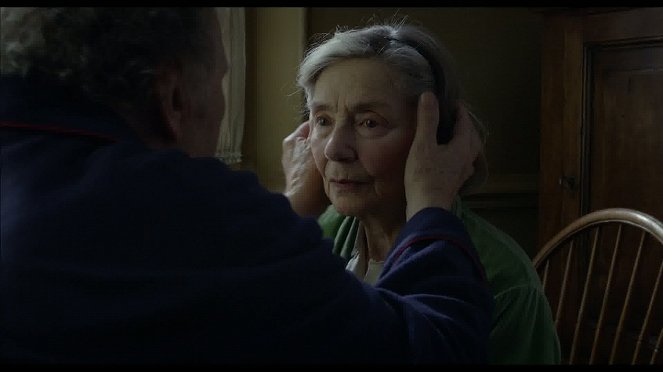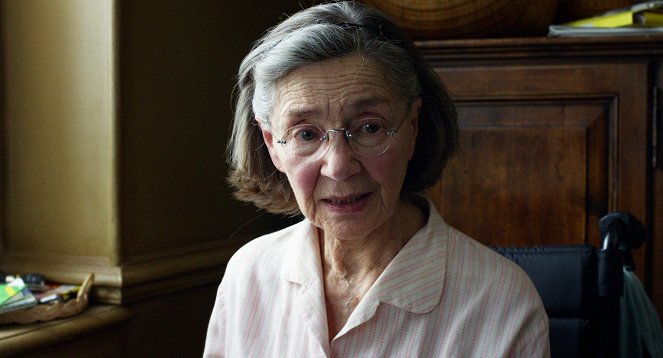Ohjaus:
Michael HanekeKäsikirjoitus:
Michael HanekeKuvaus:
Darius KhondjiNäyttelijät:
Jean-Louis Trintignant, Emmanuelle Riva, Isabelle Huppert, William Shimell, Ramón Agirre, Rita Blanco, Carole Franck, Dinara Drukarova (lisää)Suoratoistopalvelut (1)
Juonikuvaukset(1)
Georges (Jean-Louis Trintignant) ja Anne (Emmanuelle Riva) ovat kahdeksankymppinen pariskunta. Pitkään yhdessä ollut, sivistynyt aviopari on tehnyt ansiokkaan uran musiikinopettajina. Myös heidän ulkomailla asuva tyttärensä, Eva (Isabelle Huppert), on muusikko. Eräänä päivänä Anne saa sairauskohtauksen. Niin pariskunnan keskinäinen rakkaus kuin suhde tyttäreen joutuu koetukselle. (Future film)
(lisää)Videot (5)
Arvostelut (7)
A big disappointment: an explicit, leathery conversational, snobbish in terms of tone, and for me a completely lifeless film, from which nothing comes but the classic "life is beautiful and death is painful". Regarding filmmaker Haneke, some of the literal scenes surprise me with their cheap urgency (most of the scenes about ideas and dreams), the character Isabelle Huppert is very forcibly sewn into the film and the more there was talk of death in the film, the less it seemed to be about life to me (haha, paradoxes). At times, Haneke, the once uncompromising analyst, has simply turned into a conventional mid-cultist who escapes from a painful subject in the easiest possible way (a slap followed by "staring" romantic painting, etc.). The only really engaging scene for me was one in which the director lets the audience look for heroes in a multi-headed crowd and drown in ambivalent emotions. Then he gives everything for free. I don't like that. Although I must admit that it is sophisticated, elegantly shot and precisely acted.
()
Taking such care of the woman I’ve spent my life with is a matter of course. And such an attitude towards her departure from the world is not shocking. So why make an academically cold movie about it, deliberately avoiding emotions or deepening the story with flashbacks or supporting characters? If it weren’t for the visual minimalism, I wouldn't know this was from Michael Haneke. This time, however, his minimalism is an end in itself, not part of a clever creative intent. Amour is dull, empty pseudo-art.
()
The materialized fear of all aging couples. Haneke goes straight to the heart of the matter, limiting his determined but meaningless shots to a minimum and cutting to the bone after just a few minutes. However, he cuts relentlessly until the end. Although love fascinated me by its ability to reach the depths of the soul, because it does not become the climax of the film - but eventually a stagnant routine - the experience is only half complete.
()
Love as certainty. Love as commitment. Love as a prison. The many forms of emotion that life gives and destroys inspired Haneke to make a film that begins with a death and continues with a precise study of subjugation and the maintaining of control, without sentimentality, but not entirely coldly either. After Anne becomes paralysed, the film remains in the space of a single apartment, which we leave together with Georges only in a dream, as liberating as listening to music, the noblest of the arts. A few rooms become the couple’s new world, a miniaturised version of the world outside. They have reached an age and situation when they no longer need or want each other. Even if at the cost of complete isolation from their surroundings (the intentionally unexplained dismissal of the caregiver leaves us in doubt as to whether it was really her or if Georges simply cannot bear having anyone else between himself and his wife). The unusually long shots show all of the pain of old age without haste and without pauses provided through editing, while also drawing our attention to the slow passage of time. Nothing is momentary; every action lingers. Love as patience. Amour is a focused work of a filmmaker who trusts the talent of his actors and the perceptiveness of his viewers. Though the film carries within itself at least as many themes as love has forms (the younger generation’s perspective represented by the daughter is very inspiring), what I consider to be the most important thing in our current age of half-hearted long-distance relationships is the fact that someone has made a film about true love, whose purity is to a large extent dependent on spatial proximity. Behind what some may see as stale academic art, I believe there is hidden a topical and very urgent challenge. Should we give up love out of fear of possible pain? 80%
()
If, for example, Haneke's The White Ribbon felt disturbing and extraordinarily impressive to me, Amour represents the opposite pole of his work. It seems strongly predictable, aloof, and unnecessarily literal for my taste. True, contemporary society tends to repress unpleasant phenomena - and first and foremost among them are dying, powerlessness, and the act of death itself. If you belong to this large group, the film can reveal something to you. But a simple demonstration is not enough for me. I have already dealt with all of this in the past and I do not find film magic in Haneke's film. The director serves me something that is already finished and I do not see any room for myself in there. Not to mention the fact that it's as cold as ice. I'm giving it three stars for Haneke's undoubtedly high-quality craftsmanship. Overall impression: 55%.
()



Mainos